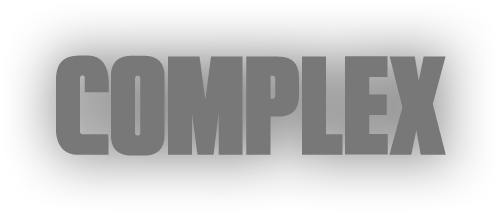

Kanye West / Honorary Degree 0%

Kanye West / Honorary Degree 0%

Interview by Noah Callahan-Bever
Illustration by Sam Rodriguez • Animation by Robert Hribernick
And I always say, “Yeah, I can totally believe it.“ He's been saying the same things since I first met him in August of 2002: Kanye West is a supreme talent with a definite vision and a ridiculous work ethic, and will you all just stop questioning him and get the hell out of his way?
Today he‘s a lot more accomplished, but faces the same skepticism. Consequently, he‘s a lot more frustrated, too.
It may be hard to recall in this era of hip-hop—where personal style trumps street credibility and rappers are emerging from all economic classes, ethnicities, and sexual orientations—exactly how unlikely Kanye West’s musical ascent was 10 years ago. 50 Cent was king and everyone else rapping was vying to be the second hardest man alive. As a result, despite West‘s successes producing for Jay Z and having a demo containing “Jesus Walks,” he could not catch a break. Columbia passed on him. Rawkus passed on him. Even Jay Z didn't see it. West almost ended up in Capitol’s house of (zero) hits, right next to Dilated Peoples.
But that didn’t happen. Because Kanye West is Kanye West. And everything he says about himself, he means that shit, like exclamation, exclamation, exclamation!!!
And it‘s a lot. I get it. When I first met him at Baseline Studios, during a Blueprint 2 session, so I could interview him for Mass Appeal, I wasn’t prepared for the full-on onslaught of epic self-confidence and shameless self-evangelizing, either. Coming from a family of low-key arrogant brainiacs that champion feigned humility over braggart salesmanship, I too was taken aback. I was expecting your typical beat-making rap nerd. A guy like me who would want to talk about drum fills and the difference between the compression on an MPC and an ASR. To my chagrin, Kanye was way more interested in discussing his adidas, which were admittedly fire, and pointing out that he had been wearing them in the studio before certain other MCs name-dropped them on their songs. When I threw on the recorder and tried to steer the conversation to music, he basically dismissed all my queries about beats and, incredulous that I wasn't yet up on his budding rhyme career—remember, this was pre-car crash, pre-”The Bounce,“ and pre-Get Well Soon—started rapping at me. Here‘s the scene: Early September, 2002. It‘s late afternoon and I‘m standing on the sidewalk in front of Baseline on 27th Street. The door to Kanye‘s Benz truck is open and he‘s sitting in the passenger seat, half inside and half outside the car. He‘s cueing beats on the stereo at ground-shaking volume and rapping and rapping and rapping. At me. Pedestrians are walking by looking at both of us like we‘re nuts. Needless to say, though, he got his point across.
He had a very clear idea of what he wanted the Mass Appeal story to be, too, and was not shy about letting me know. Throughout the five- to six-hour ride-along he would often say things like, “When you’re writing this you should say....” Later, at his apartment in Hoboken, I chuckled noting that he had nothing on the walls except an early flat screen (which replaced the box-TV infamously given to Sway) and a poster of himself wearing a Nolan Ryan throwback, which he’d blown up from a quarter-page photo that ran in The Source’s Roc-A-Fella cover story. This guy... I thought.
But I got over the initial shock of Kanye’s Kanye-ness as soon as he started playing sketches of what would become The College Dropout. I started to understand him and his behavior. It all made sense. This dude was attempting to buck every trend, every assumption of “what would work,“ and quite literally change the course of popular music. And, in quick succession, popular culture. Frankly, you have to have King Kong–size balls to even consider such an ambition. And to actualize it, you have to be an unstoppable force. And unstoppable forces are, by nature, grating. They’re motherfucking unstoppable, yo!
So of course he had to sell me on his rap skills or die trying. And of course he was micromanaging the interview—every sentence could either advance his agenda or not. And of course he had to have the hero shot of himself blown up in the crib. He was visualizing himself as a star. The grating and the great were inextricably bound. And, for this, we should be grateful.
Look at the landscape of music and culture today. It all starts with The College Dropout, and West's audacious belief in his own ability to change the world.
Here‘s a conversation with young Kanye West, back before I or anyone else knew who Kanye West was going to become—except Kanye West, of course.
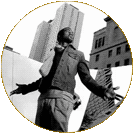
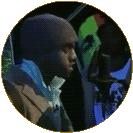
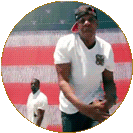
What’s this beat?
When [Jay Z] first heard it, he stopped the beat, called Hip-Hop—who was my manager and also Hov’s main A&R—into the room, and started talking about, “Man, y’all understand what this is? Why y’all not hype?” Hov don’t ever show that much emotion, and he’s like “Yo, let’s call Hype Williams right now.” He started thinking up video concepts before he even wrote the rap. That’s how crazy—he just knew it was crazy like that.”
So is that done now?
Yeah, he got it up there right now but Beyoncé’s part is not on it yet. This right here is kind of crazy, though. [Turns up beat for “03 Bonnie & Clyde”] …I was supposed to write some shit like:
[Rapping.]
Ayo, planes, trains, automobiles
The G500 with the auto-roll wheels
The Pinot Grigio got ‘em on chill
See now, see me hoe, I got that deal
If you trying to build, I bet you’d like that
My father was a Black Panther with Geronimo Pratt
And back in college I ain’t run with no frat
I just ran with the track that put the Chi on the map [1]
Now the Roc in the building UIC Pavillion
Two years ago I was just a civilian
Now every chickenhead swear I got millions
In area codes with unidentified children...
Hold up, hold up. [Cuts off the beat, keeps rapping.]
I used to want the Jordans that’s most recent
Now I throw Jordans on the whip just to look decent
Just to get pulled over by the precinct, so frequent
It’s like I’m back being a delinquent
They want to know where I live, stay and work
How a young black nigga get all these perks
How I stack my paper, got adidas in every flavor
Excuse me officer, I don’t know Rod Laver
Or Stan Smith
What they don’t understand is, how I got that color in canvas.
Then he got this other song that the Neptunes produced. I was like like, “Yo, man. I know you going to laugh when I say this but you need to let me rap on your first single, right?” [Laughs.]
How’d that go over?
The song was already complete, he wouldn’t let nobody—not Cam, not Beans, nobody was rapping on this shit. Not Michael Jackson. No one. I was like, “Let me rap. Because I’m really finna surprise y’all how big of an artist I’m finna be. [2] Y’all gon’ be like ‘Damn, don’t he do beats too?’”
But my rap I had for it, it was like on some grown-man shit like how the rest of my album is. It was real similar to the vein of shit I talk about: Concepts, relationships, dealing with, like, real people, not just dealing with fans looking at stars or just like, “I’m a big rapper.” It’s more like “I’m one of y’all.” And that’s how Hov’s rap was, like, “Yo she’s talking to Shawn not Hov.”
So my rap, I came with said...
[Rapping.]
She said “Kanye who? You produce?“
Act like she all out of the loop
Like I couldn’t make all this loot offa all these loops
Says she don’t listen to Roc-A-Fella, she just listen to Roots
Says she don’t like trucks, she just get into coupes
Survey says my chance is real low of knocking the boots
I got a Plan B planned out for when things don’t pan out
Hov tell her you my brother and I’ma play Chi brother
And you take the Destiny’s Child girl in the coupe
And I’m gonna try to bag the ones that got kicked out the group
Figure that’ll be simple, I just help them with they demo
Help them to the limo
Play nothing but instrumentals
That old Luther Vandross
Al B gentle
[Sings] I’ll be very gentle, remember that?
She grabbed my tattoo, peeped the credentials
Grabbed my pants, peeped the potential
We breaking all the fundamentals
Trying to find something fun to get into...”
Then that nigga [Jay] was like, “Ooooh! That shit is crazy! —Nope.” [3][ Laughs.]
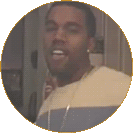
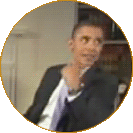
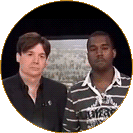
What are your parents’ names?
Donda West and Raymond West.
What do they do for work?
My father did a little bit of everything coming up. He was a photographer when I was young and he had a loft apartment when we stayed in Atlanta. They always had nice cribs.
Then my father ended up being a salesman. I remember he was in vacuum cleaner sales and we used to go to white people’s houses and he’d sit up there and show them how powerful the vacuum cleaner was by putting a penny on the floor and then put the vacuum cleaner over it and then Pop! It would come out and he would have bent the penny. And then he’d get up there, like, “Look at this vacuum cleaner!” And he’d give them his card and he’d take me to go get some ice cream or something.
And then the next day I’d see him go to some other white person’s house, put down the penny and shit, like, “Look at this vacuum cleaner!” We had a Nova and I remember some days we would ride around and he had vacuum cleaners in the back and we’d be going up a hill and the car would stop. And I just see him, like, “Not today. Not today.”
How long were your parents together?
Until I was like, 3.
And then your father moved out?
I used to go to Atlanta to see him, but when I was 6 or 7 he moved out to Maryland for a job. I forgot which job.
Did he ever remarry?
Yeah. He married four times. He works as a Christian marriage counselor.
I can see why.
Yeah. [Laughs.]
He probably knows a thing or two. And your mother?
She never remarried. But she had this one boyfriend [4], who to me to this day was like my step-father. I feel like he helped teach me responsibility, like I ain’t get to go play basketball. I had to cut the grass—but look where I’m at.
My mother was going to be an actress when she was young. When she graduated from her four-year program to get her bachelor’s degree, she went to some acting tryout. And if she had gotten that she would’ve followed the acting. But she ain’t get it so she went back to school.
Where’d she go?
She went to Clark in Atlanta. That’s where she met my father. And now she got her Ph.D in English, so then she became a teacher and she found a job at Chicago State. I went to Chicago State for half price because I didn’t want to be in school no way. It was just something to do while my music wasn’t really popping. By that time my mother became the head of the English department. The first black chair of the English department at Chicago State University, not to mention female. So now she had the department and I could just turn in my homework whenever I wanted. My whole goal when I went to Chicago State was just to walk around with my Ghostface chain, Polo’d up. Just be the coldest.
So take me back to college, did you graduate from school?
Nah, man. I’m a college dropout. You ain’t heard the album title?
Nah.
That’s the album title.
Oh it is? Hey man, I’m right there with you.
That’s exactly what I want people to think with that title: “I’m right there with you.” I’ve thought about calling my shit I’m Good, because that’s a “cool” title, like just having a title that’s like, “Yo, you can’t criticize that.” But for me to try and put on the facade of being the coolest motherfucker ever, it’s not going to come across like that. I’m not saying I’m the coolest motherfucker ever, I’m just saying I’m just a fucking smart-ass. [5] I got to put it in raps.”
Tell me about growing up in Chicago.
In Chicago you’re going to do one of three things. You’re either going to be sports—straight basketball or football—or you’re going to be hip-hop, like really focus on hip-hop and the culture—or you going to be gangbanging. You might be doing all this and gang-banging at the same time because 99 percent of people in Chicago is gangbanging.
We was gangbanging in kindergarten. We was on the school bus throwing up gang signs like, “Which gang sign was which again?” Perpetrating and shit. Moving our hats to the whatever side, and when the Starter coats came out, “I’ma get the Bulls and I’ma do this, this, this.” And if you wasn’t none of that, you was just a fucking lame and shit.
That’s how Chicago is. This gangbanging shit is so real that you not going to front whatsoever. Once you grown and you see niggas getting their heads chopped off and you going to funerals, you either going to take it to the fullest or you going to be like, “Nah, it’s not for me.” I know it’s not for me. I know that.
So basically, my main focus became music. I been making tracks since seventh grade. I was on the basketball team freshman year. I used to play for Eisenhower and we went to some tournament or something. But by sophomore year, I had been working on my music so much that by the time we went to tryouts, I’m just straight missing layups and shit.
So you just decided to...
I didn’t decide. God decided for me. Niggas was looking at me like, “Maybe this just ain’t your sport.” I remember when we was in the layup line we had to clap our hands like this [regular clapping] but when I was doing my clap, my shit was more like [claps and knocks beat], and niggas was like, “Damn. Maybe that’s what you need to do and shit.” [Knocks twice.] So at that point, basically, I just switched over to focusing on that.
You said you used to bring back slang and whatnot from the East Coast.
Yeah. My father stayed in Delaware for the latter part of his life but his father was in the Air Force, so he had to fly around. He spent some of his high school years in Germany so he was never at one school. And they always stayed around white people.
So when he finally got the opportunity to go to a black school everybody was like, “Yo, you talk white.” They wouldn’t accept him. And when he was around white people, you were a nigga off the bat so they weren’t trying to accept him. I seen how that hurt him. So whereas my father struggled with that, basically I learned how to speak every language.
I always talk about racial issues [6]—black people and white people interacting and racial profiling and all that—because I got locked up one day for having braids and driving in an Expedition. And they said, “Your braids is what gave you away.”
How all this relates is—I ain’t trying to front. I’m aware of shit. Because a lot of rappers.... Am I supposed to get here and say, “Yo man, I sold drugs and I did this?” Because I never did none of that. Is that automatically going to lower my record sales like crazy because I said I never sold crack? I apologize. I just went and got a job. Whatever.
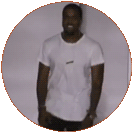
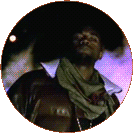

So what was the first thing you started building beats on?
The Casio, that old sampler that everybody talks about they had. I didn’t have that until some talentless dude down the street had it. And he would never let me keep it—he’d just come over with it. My mom had bought me a keyboard. Just to establish, she didn’t know—I wanted to be a freestyle biker, I wanted to draw, make video games—so she didn’t know I wanted to make beats. I remember one day when I was making beats in her crib, she told me, “Kanye, until you make money off this, it’s a hobby.” [7] But she’s never the type to say nothing negative toward music.
She wanted to get me the keyboard with the big keys so I could learn how to play. The other keyboards had small keys, but that one had sequences on it so I could play and save it. But she didn’t buy me that one because it was $50 more. She was like, “I don’t want to pay for that.” Then she turned around, totally redeeming herself, and she helped me get my ASR 10 keyboard.
I really started getting into the music thing around freshman year—around the time of my short-lived hooping career. I was with my father when I was 14 years old talking about, “I want a Korg keyboard.” Because the best keyboard I ever saw was the Korg. So we went to a music shop and I said I want a Korg and the guy was like, “What kind of music do you make?” I said “hip-hop,” and he was like, “People like you do what they call sampling.” I could never figure out why EPMD beats were so much better than what I hear in my head.
So he went up to show me a keyboard, it was an old Ensoniq and I hit a key and it played the drums from “Summertime.” I was like, “Oh shit!” You would’ve thought I saw Michael Jackson or something. I was like “Damn. This is crazy. This shit sounds so cold.”
I know you produced Grav’s “City to City.” Was that the first thing?
Yeah, the Grav album was the first shit that came out—damn, you brought it back for real. I did three joints on the album. I rapped on Grav’s album, too. I was 18 when I did Gravity’s album.
You were in school?
I was going to college.
Where at?
Chicago. By that time I was going to Chicago State University. I met Grav when I was going to the American Academy of Art. With his album I made $8,800 off of eight beats altogether—like $1,100 a beat. I took half the money and I bought one of those Jesus pieces like everybody wore, but back then Ghostface was the first nigga with that chain. So I had a Ghostface Jesus piece and I spent the other half on Polo, because Polo was real in style. I’ma say it was the smartest investment I ever made with my money. [8] What was I going to get with $8,800? At least I got something that I could keep for a second, you know what I’m saying?
Then it got to the point where No I.D. was finna play out his album, and he wanted my chain for the video shoot, but he didn’t want to wear somebody else’s chain. He said, “I’ll trade you my SP1200 for your chain” because my drums was weak so he was saying, “Yo, you need an SP1200.” I ain’t have no money, but I had the chain so we just traded and he rocked that chain in his first video with Doug Infinite.
That’s funny. The “State to State” video?
Yeah. I think that’s what it’s called.
What records were pivotal to you?
The reason I’m so real today is because of MC Hammer and Kid ‘n Play. Those were my favorite rappers back in the day. I felt like they was real. They making music that I wanted to hear. I remember someone played me some Jungle Brothers, and I was like, “Ew, I’m not feeling that right there.” De La Soul’s “Me, Myself, and I” was the first hip-hop song I liked. At that point it was EPMD, Run-DMC, LL Cool J, Beastie Boys. Remember that? I’d be at my mama’s crib. This is back when people used to sit they record player on top of they TV.
What music do you listen to for inspiration?
Midnight Marauders. I listen to certain classics to figure out where I want to go. I listen to Lauryn Hill’s album, Pharcyde’s first album, that’s one of my favorite albums of all time. That joint still sells 1,000 a week.
You say you weren’t feeling the Jungle Brothers. Where did you pick up your ear for that sound?
I got that from No I.D., from Common Sense’s first album, which is much later than the Jungle Brothers.
It’s definitely the same thing though.
It’s the same thing but the way they was doing it wasn’t like they made me want to do it. It’s kind of like how people had soul beats, but there’s something about the way me, Just Blaze, Bink, and Jay Z did on The Blueprint that made everybody want to do it. People had throwback jerseys for the longest. I went out and bought that actual jersey soon as I saw Big Boi in the “Sky High” Goodie Mob video. That was what, six years ago?
Yeah ’97 or ’98.
OK, so four years ago. You remember when he had that throwback on?
Yeah!
I went out and bought one. But there was something about Hov and Fabolous, something about the way they did it made everybody go out and get it. And I’m a good producer but the opportunity to have Hov rap on your beats makes all the difference in the world because he sets trends. People do what he does. They want to do whatever he does, he’s like the poster child of industry, fashion, business, hustler [9], everything that people want to be. So when Hov rapped on soul beats everybody else wanted to rap on soul beats.
You worked with dead prez, Jermaine Dupri, and the Harlem World shit before 2000?
Yep.
Speaking of which, I just noticed that Harlem World had a joint from you and from Just Blaze.
That was crazy right?
Was that random?
Ma$e is the type of rapper that wanted to give new producers that he felt a new drop. So let’s not forget Ma$e, to a certain extent, found Just Blaze, Kanye West, and The Neptunes. That’s a nigga that knows how to pick beats. Ma$e found them, but Hov—to a certain extent—made Just Blaze, Kanye West, and The Neptunes stars.
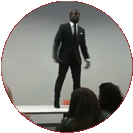
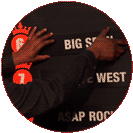
When did you first start rapping?
I’ve been rapping since third grade and I had to figure out at an early age about audience and who you’re rapping to and saying the right thing to your audience. Right now I could spit any of my raps to a nigga on the corner, somebody in a barbershop, but I could go into a corporate office and say the same rap [10] and they will understand what I’m talking about. It’s so universal.
I remember I was trying to get in this talent show and the Fat Boys had a song so we formed a little group, we made ourselves be The Skinny Boys—it was OK to bite back in the days. So we got up there and we sang our song and the song was [singing] “The fat girls are back/And you know they will never be wack/The fat girls are back….”
Why did I not take into consideration that our music instructor that we’re performing this for, was like about 260 pounds? So at that point I figured out the audience and who you’re rapping to could be the key to whether or not you make the talent show.
I don’t think that God gave me any specific talent other than the ability to learn how to do things. Because when I was focused on basketball, I was actually kind of cold but now I’m mad mediocre. I was an artist ever since I was little. When I was focusing on that, I won every contest and got a scholarship for my first year of college to go to the American Academy of Art and The Art Institute, but I went to the American Academy of Art. And now, if I sit down and try to draw, it’s going to be decent, but it’s not going to be like, “Yo, dog, you won a scholarship.”
So now, look, I said, “I’m going to focus on beats fully.” And then I ended up doing the most beats on the first classic album of the century, [The Blueprint]. Now, I’m partially responsible for the most classic albums this century because of the Scarface. I know I need a real powerful way to word that, but I’m partially responsible for the most classic albums this century because I focused on that.
Now, is he going to be a good rapper? We got Grammy nominated for “H to the Izzo” for the album The Blueprint and I said, “Look, I’m going to focus on rap,” and I ended up on the hottest rap label in the world. What the fuck I look like rapping? How did I end up on Roc-A-Fella? I never had a good voice. I never really had a good rapper story. I wasn’t ever that much of a pimp where I just had mad girls. I never was shooting at niggas, so what was it? It was just focus. I decided I want to do this.
That’s another reason I want to rap, too. Not just to be a rapper, but to express my sarcastic, my asshole opinion about things. My blunt, “Like, look dog, that’s stupid to me,” opinion. I wanted the opportunity to not just be having hot shoes on, then the rapper see the shoes, and put them on TV. I want a chance. Let me do the photo shoot. Let me get a deal and see my face.
Nobody really could understand the passion I had for my music because my beats, as good as my fuckin’ raps are, still surpass my raps. The only way that my raps could possibly be as good as my beats, I’d have to be as good as Eminem or as good as Jay Z [11] because that’s the caliber of my beats. But I could still be not as good as Eminem or Jay Z and still be a number-one rap artist. It’s hard to compete with my beats, man.
Capitol, they offered me like a half million or something like that, then right before, I think one of the people at Capitol said, “Nah, I don’t fuck with Kanye because if he could really rap, Def Jam would’ve signed him or he’d be on the Roc.” So it was a catch-22.
People were like, “Damn, if the Roc don’t believe in him, then why should we go with him?” So they passed. They passed and I signed with Roc-A-Fella. Then they bring in 50 motherfucking Cent and they passed.
So I want to definitely give props. In this article can we please put, “Gee Roberson, Hip-Hop, Dame Dash, Hova, and Kareem ‘Biggs’ Burke changed my life.” I want to put all those names because I don’t know who I could give more credit.
Can I give more credit to Hip-Hop for realizing that I could actually be an artist and a producer and saying he wanted to manage me? Do I give more credit to Gee for dealing with Kanye the fucking “I want it right now” asshole every single day? Do I give props to Hov for establishing me as a true quality producer?
Do I give props to Biggs for every song that I come in with, suggesting shit like, “Yo, let’s put Michael Jackson on the ‘Girls’ remix,” you know what I’m saying? Do I give the props to Dame for signing me to Roc-A-Fella as an artist and saying, “Dog, listen. He can rap. I’m Dame Dash. I said it. Fuck with me.”
This is what Dame told me when he heard it: “Yo, man. Yo on the real that shit is scary, man. Fuck with me I’ll fire niggas.” I was about to sign with Capitol Records and I just wanted to play some songs in the studio with Cam and these real rapping niggas just to see how far I got. So I played this one song and Dame was like, “Oh shit! It’s not even wack. It’s not even wack! That shit is kind of hot. OK, OK play some more.” Young Guru was telling me which songs to play, because he was the ghost A&R at Roc-A-Fella. So then I play “Jesus Walks” and he heard that, he’s like, “Yo, Cam. Cam! We should sign Kanye. What you think, man? We could do like the East Coast Chronic!”
So on the new album you’ve got “Two Words,” “Keep the Receipt,” and “I’ll Never Change.”
And this song right here is “Hey Mama,” which I’m going to play. They accidently put ‘Hey Ma,’ I’m like, “No. This is ‘Hey Mama.’ There’s a reason.” Because these songs have meaning, the words alone mean something. It makes sense in paragraph form.
Tell me about this song and about your relationship with your mom.
“Hey Mama.” My mama is definitely responsible for me being here and supporting me. And the song I made for her is the greatest song I ever made. I don’t know if I could ever make a song better than this, ever. She was just always supportive—never one of those “You need to give that dream up” people.
Aside from Dre and Large Professor, there have not been that many producers who became successful rappers. How good is your new album going to be?
I think Large Professor’s dope. Anything I would say would be too arrogant at this point. But I feel like I really am going to be a very, very big artist. Not just a hip-hop artist or just an underground rapper.
When “Looking Out the Front Door” came out, it was a big record, as big as rap was back then. I don’t think they were considered underground.
Maybe it will be like that, then. Because I figure at this point with the sound that I got, the hardest part will be making a second album.
![]()